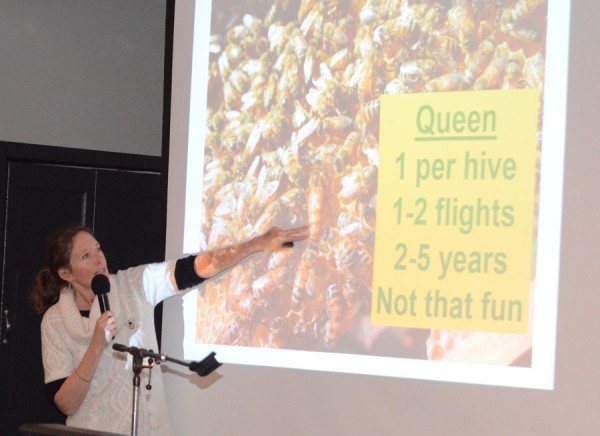‘Queen Bee’ Shares Her Addiction To Bees
Charlotte “Queen Bee” Hubbard, southwest Michigan, shared her addiction and love of the pollinating insect, the honey bee, Tuesday evening. Hubbard was the guest speaker at the annual Kosciusko County Soil and Water Conservation District annual meeting.
Combining humor with educational information, Hubbard shared stories of the three people who influenced her into being a beekeeper. “I love working with honey bees and keeping bees,” she noted. “It was not by choice,” she shared.
Her influences were her father, a fruit farmer and who had bees on the farm for pollination; her mother, who cared for the bees; and her late husband, Tom, who also was a beekeeper and asked her to take care of the bees before his death.
Hubbard started with five hives that helped her through the grief of loosing her husband. A year later she met her current husband, who also liked honeybees. Today they have 20 hives and over one-half million bees. They also are called upon to remove honeybees from unwanted places such as attics, trees, eves and other locations.
Hubbard, who admitted she is nuts about bees, stated one out of every three bites of food are pollinated and all the “yummy” foods are by pollinators. The pollinators include bats, beetles, birds, butterflies, flies and of course honeybees. She also explained the honeybee chain — queen bee, drones and workers — and each one’s responsibilities.
Funny finds and occurrences were also shared by Hubbard, including being called to a home where the resident found honeybees in her attic. What they found were honeybees had built a hive between floors and honey was seeping through the kitchen ceiling. Another instance was when her honeybees had swarmed and settled on a tractor tire on her father’s farm instead of other locations on the 735 acre fruit farm.
She asked those attending to support pollinators through minimizing chemicals and pollution, supporting local beekeepers and supporting land conservation efforts. This included planting native plants, having swaths of plants and always having something blooming and plants going to seed, leaving fence rows, minimizing tillage and other conservation efforts.
She noted honeybees are complex but humans can be safe and helpful to the bees. “They are important insects and vital for pollination.”
Hubbard speaks nationally about honeybees, often focusing on the human-bee dynamic. Using a humorous style, she willingly shares her personal “oopsies” regarding the stinging insects.
Copies of Hubbard’s book “Dronings from a Queen Bee’ recalling her first five years, were available to purchase with all proceeds going to support food bank charities. She stated more information could be found on her website www.hubbardhive.com and she she would be “bee-holden” to those visiting the site.
Guests attending the annual dinner were also enlightened to the world of pollinators with a placemat featuring “Local Heroes, Your Hardworking Pollinators.” The placemat included several puzzles as well as information.

